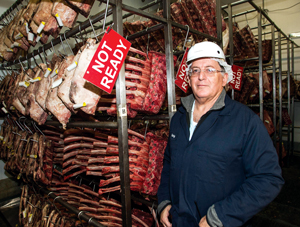
Harry Greenberg is old school. The chief executive of meat supplier Premier Meat Co. in Vernon has been running the business for more than 20 years, delivering fresh meat and seafood to restaurants each day.
But now he’s trying something several new-school companies have failed at: meat delivered by mail. Premier this month launched an online store aimed at consumers, not the company’s core restaurant clients.
Greenberg said his new online shop has an advantage in that it is simply an extension of Premier’s business. Most online food-ordering startups attempted to build from scratch and relied on online orders alone.
“We didn’t try and start a new online store to convince people to buy our product,” Greenberg said. “This is what we already do here for 2,000 restaurants in Southern California.”
He also pointed out that he’s using the company’s existing facilities – not renting a new refrigerated warehouse just to fill mail orders.
Customers can order from about 60 cuts of Premier’s steaks, poultry, seafood and wild game. Products are packed and shipped from the company’s Vernon facility. Some are relatively inexpensive – $5 for a pound of free-range chicken tenders – though most are pricey: A pound of beef bone marrow costs $45, a 2-pound filet chateaubriand costs $108.
Greenberg got his start in the meat business as a driver for a local poultry supplier. He later went to work for Wayne Provisions and, in 1994, bought the company, renaming it Premier Meat. Back then, the company had nine employees and sales of about $1 million annually, Greenberg said. Now it has 240 workers and annual sales of about $110 million.
The idea of starting an online store came up over the past few years, around the same time Premier updated its logo, painted its fleet of 40 trucks in black and orange and expanded from 25,000 to 75,000 square feet.
Hadar Almog, Premier’s director of marketing and communications as well as Greenberg’s daughter, said the rebranding made the company more recognizable to consumers, and the expansion gave it extra space, opening the door for online sales.
“It was just a company, but it didn’t have the sex appeal that it needed or the style that it needed,” she said. “With the expansion, there was a little bit of room to make the online store the highlight of Premier.”
Selling meat online isn’t the first time Premier has tried something new. A few years ago, Greenberg shifted the company’s ordering and production schedule to begin at 6 p.m. instead of in the early morning.
He had noticed that chefs would typically end their nights around 11, and that’s when they’d know what to order for the following day. But most meat suppliers require restaurants to put in their next day’s order around 3 p.m.
By changing its production schedule, Premier allowed chefs to place their order as late as midnight and receive their goods the next morning. The company processes about 600 orders a day.
On your doorstep
Dropping fresh meat and produce at a customer’s doorstep has been the lofty goal of several local food delivery startups, although the failure rate appears high. Last year saw the fall of both Pop-Up Pantry in Hollywood and Fresh Dish, a service that came out of Santa Monica tech incubator Science Inc.
Pop-Up Pantry sent high-end frozen meals to customers’ doorsteps, but those meals proved overly pricey thanks to the high cost of shipping. A dinner for two, which customers had to reheat and assemble themselves, cost $90.
The company went bust after less than a year, and burned through most of the $1.7 million in cash it raised from investors. Rick Smith, managing partner at Crosscut Ventures in Santa Monica, an investor in Pop-Up Pantry, told the Business Journal earlier this year that there’s little room for error when shipping perishables.
“It can’t take a slow boat from China or be left in a West Texas warehouse in July,” Smith said.
But Premier has done its homework. Almog said the company spent two years researching and developing the online store concept, which included eight months of testing various packaging methods and shipping.
When a customer places an order online, it’s processed in the same manner as a restaurant order. The only difference is that it’s shipped via Fed-Ex to a customer’s address.
Premier’s butchers cut meat based on a customer order, package it in a vacuum-sealed plastic bag and place it inside an insulated bag. It’s then packed in a specially designed cardboard box filled with ice packs that can keep the meat cool for about 36 hours after it has been shipped. Unlike mail-order meat leader Omaha Steaks, Premier doesn’t use plastic foam coolers or dry ice.
Almog said the foam isn’t environmentally friendly and dry ice causes freezer burn.
Shipping costs vary based on location and order size, but orders over $75 are shipped for free in Southern California. Elsewhere, customers can pay a flat shipping fee of $15 or $25 for orders of more than $125, based on location.
The online store has only been live for about three weeks, and the company hasn’t advertised, trying to start slow. So far, Almog said Premier has been fulfilling about 20 orders a week.
But whatever happens with the Internet business, she said Premier will survive. Unlike Pop-Up Pantry and other failed firms, it isn’t dependent on its online venture.
“If, God forbid, it didn’t happen – we made an investment, we tried and nothing happened – Premier continues,” she said.
